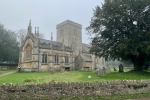November 2017
Vision and Planning
Visioning and planning at ECF’s first Spanish Bootcamp
This article is also available in Spanish here. Este artículo está disponible en español aquí.
On August 19, 2017, the Episcopal Church Foundation (ECF) organized the first Financial Literacy Bootcamp in Spanish. There were people from four dioceses and nine churches in attendance at St. Mary Magdalene, Wheaton, MD in the Diocese of Washington. The full-day event was the culmination of months of preparation, inquiries, and finding just the right people for this event.
As Spanish language resource consultant at ECF, I had the opportunity to speak with many clergy and lay people about what their needs were on the topic of financial literacy. The vast majority said they needed “the basics” of both personal and parochial finances, and stewardship. We incorporated some of the curriculum components that ECF had already developed and invited two Latina experts in financial literacy to help us turn this dream into reality.
At the event, after Bible study, each church team introduced themselves and their church, and a brief discussion on the difference between stewardship and fundraising, the first module on Vision and Planning was presented by our President, Donald Romanik. This was followed by modules on finances, both personal and parochial, and team building. I noticed the participants were taking notes, asking questions and appeared to be very engaged.

After the bootcamp, I followed up with the different church representatives and there was one common thread in what I heard: “el Bootcamp” (as we at ECF called it) had renewed and focused their planning. In other words, their visioning process had begun. All the churches represented were in different stages of planning, visioning, and implementing what they had learned. As a teacher, it was inspirational to hear that our own planning and vision was paying off.
Reflecting on the past bootcamp, several participants said that if they can maintain a clear and transparent vision, they will be focused on healthy personal financial habits, and their church administration will probably fall into place. There were a couple of participating teams who said they had not begun to use the tools we gave them, but as we spoke they realized they had been using them while visioning and planning for their stewardship campaigns. All the groups said they had gone back to their vestries to share what they learned and to see where they could go from there.

A story that I have heard in several congregations (not only in the ones who participated in this bootcamp) is that there are some groups within a congregation who have raised money and have decided to either keep it in their own homes or in separate bank accounts other than the general church fund. One of the priests told me that because of the bootcamp training module on Mission and Vision, they have realized the need to put the “separate” money into the general account because it helps to fund the church’s one mission and vision.
Part of the definition of vision given in the module encouraged participants to think big, light their passion, and live and challenge their dream. Rev. Fred Clarkson, from the Diocese of East Carolina said that one thing he took back to his diocese was “the importance of stewardship development if we are to model faithful communities.” Having a clear vision of what a faithful community can be, is lighting their passion which will help them live and challenge their dream.
Although the day was jam-packed, we ended it with some time for teams to plan. Since most teams had never done anything like this before, we encouraged them to look at their mission and envision where this could take them. Edith from San Mateo, MD shared that this process was most helpful to them as a team. When they went back to their church, their group spoke not only to the vestry but also to their congregation. They have been working towards parish status (self-sustainable) and part of that process is to start paying their vicar’s salary. Although they are scared she said that this training came at the right time because it helped them focus their efforts towards a sustainable future. They knew what they were working towards, but had not planned what that would actually look like. San Marcos, Diocese of Virginia, has an interim pastor and although they were very excited and energized, they also wondered how they could plan for an unsure future. The participants from the congregation took the information and worked on creating not only a mission statement, but also offered up a renewed vision for their church. One of the participants said that creating their visioning board (part of their homework) gave them a visual of what they hoped for in their church, and planning as a team helped them remember that they will be able to work with their future rector.
ECF is planning a day and a half long Spanish Bootcamp in 2018 and we are hopeful that it will be as fruitful as our pilot.
Sandra Montes was born in Perú, grew up in Guatemala and settled in Texas as soon as she could. Her passions are God, family (especially her son), music, education, and writing and she has been hoping and praying for this position for years.
Sandra has been developing original bilingual resources for her church, school, and others for years. Sandra has been volunteering and working in the Episcopal Church since she was welcomed in 1986. She serves as musician, translator, speaker, consultant, and writer. She earned her doctorate in education in 2016 and is a full-time freelance consultant and musician.
The Episcopal Church Foundation (ECF) has received a three-year grant as part of Lilly Endowment’s National Initiative to Address the Economic Challenges Facing Pastoral Leaders. ECF’s grant entitled “From Economic Challenges to Transformational Opportunities” will provide lay and clergy leaders of the Episcopal Church with resources, tools and other support to help address the financial and leadership challenges of congregational ministry in the 21st century. This article was made possible by the Lilly Endowment grant. For more information on ECF’s Lilly Endowment Initiative go to www.episcopalfoundation.org.
Resources
- Team Leadership an ECF webinar led by Rosa Lindahl, March 26, 2015
- Vital Teams: Team Leadership Essentials an ECF webinar led by Ron Byrd, December 10, 2015
- Teams Built on Trust by Rosa Lindahl, Vestry Papers, March 2014
- Why Vital Teams? by Miguel Escobar, Vestry Papers, March 2014






